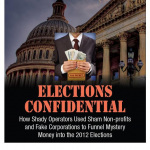Elections Confidential
“Elections Confidential” describes how secret donors poured hundreds of millions into the 2012 election through “social welfare” non-profits that are really political vehicles and via shell corporations formed as conduits to hide a funder’s identity.
Downloads
NJPIRG Law & Policy Center

“Elections Confidential” describes how secret donors poured hundreds of millions into the 2012 election through “social welfare” non-profits that are really political vehicles and via shell corporations formed as conduits to hide a funder’s identity.
The first post-Citizens United presidential election cycle was bought and paid for by a handful of wealthy donors, but the corrosive influence of money in politics was amplified by the fact that we don’t know who – or what – actually provided much of the funding.
Despite widespread public support for disclosure and decades of legal precedent supporting the public’s right to know the sources of election-related spending, voters were bombarded with messages from secretly-funded, innocuously-named “dark money” nonprofits that do not disclose their funding sources. Even those groups that do disclose their donors received millions from fake corporations that covered the money trail.
Key findings include:
- Shell corporations that do not disclose the sources of their funding funneled at least $17 million to Super PACs in the 2012 elections.
- Nearly seventeen percent of all business contributions to Super PACs came from identified shell corporations.
- Dark money nonprofits reported spending over $299 million in the 2012 election; however, because these groups ran “issue ads” that need only be reported when aired just before primaries or election day, the total spending by these nonprofits is certainly much higher than was reported to the FEC. Crossroads GPS, for example, told the FEC that it spent just under $71 million in the 2012 election cycle, but it actually spent more than twice as much as was reported, topping at least $165 million.
- Dark money nonprofits, which are not supposed to have electoral intervention as a primary activity, will justify their tax-exempt status in the post-election period by engaging in activities like lobbying. Incredibly, this qualifies as advancing the “social welfare.
- A dark money group’s lobbying clout is amplified by the fact that, come election time, they can back an uncooperative lawmaker’s primary challenger.
- With both “dark money” nonprofits and shell corporations, it is almost impossible to identify violations of election or tax law, such as the infiltration of foreign funds.
Read Billion-Dollar Democracy, our full report on outside spending in the 2012 election cyclye, and Outside Spending, Outsized Influence about outside spending in the New Jersey House and Senate races.